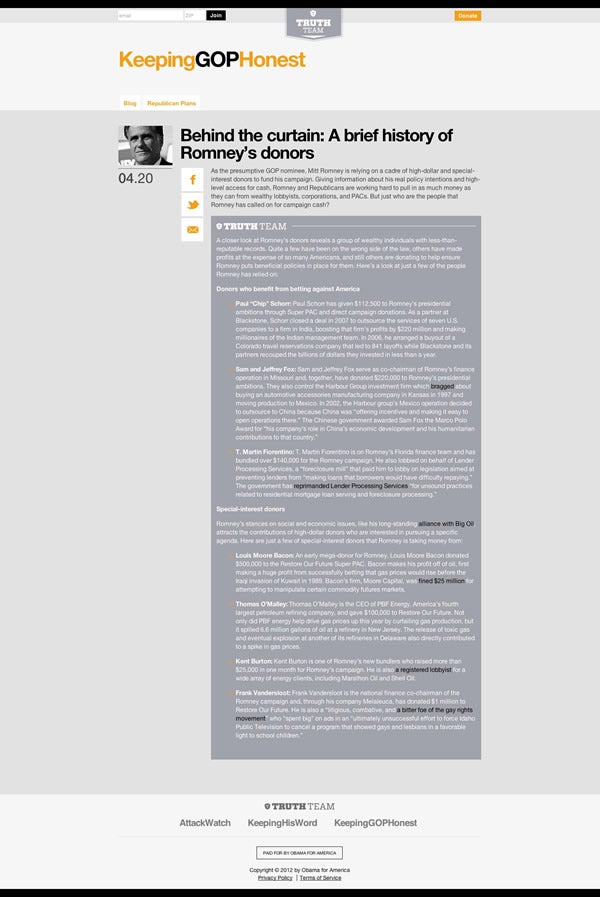President Obama’s Enemies List
Rory Cooper /
In 1971, America was introduced to President Richard Nixon’s “Enemies List.” The President had instructed staff to keep a list of political opponents, and as then-White House Counsel John Dean described it, they would “use the available federal machinery to screw our political enemies.”
On the list were notable figures such as Paul Newman (actor), Charles Dyson (businessman), Rep. John Conyers (D-MI), NPR newsman Daniel Schorr, Morton Halperin, a foreign policy expert and father to political journalist Mark Halperin, and others. This secret list was the subject of justifiable scorn in the midst of the Watergate scandal.
In 2012, President Obama’s campaign has managed to make Nixon’s list look quaint, legitimate and even routine. This week, on the president’s ominous “Truth Team” campaign website, his staff listed the names of eight of his likely opponent’s donors. They were listed in this way: (Post continued below.)
“A closer look at…donors reveals a group of wealthy individuals with less-than-reputable records. Quite a few have been on the wrong side of the law, others have made profits at the expense of so many Americans…”
After each name, the campaign lists deeds that they find objectionable or “less-than-reputable” that mostly boil down to business transactions that included alleged outsourcing or layoffs and involvement in the oil energy industry.
For example: “They also control the … investment firm which bragged about buying automotive accessories manufacturing company in Kansas in 1997 and moving production to Mexico. In 2002, the … group’s Mexico operation decided to outsource to China because China was ‘offering incentives and making it easy to open operations there.'”
Each name was then tweeted out by the @TruthTeam2012 twitter handle with similar charges.
This follows a multi-year effort by the ongoing Obama campaign to vilify specific donors to competing philosophical causes and demands that organizations release lawfully protected donor lists or donors reveal lawfully private and personal financial information.
In each of these instances, President Obama has relied on a vast grassroots network to coerce, bully, boycott and vilify individuals lawfully taking part in the political process, just as his own donors and supporters are freely allowed to engage.
There are subtle differences between Obama’s and Nixon’s enemy lists. President Nixon kept his secret, and allegedly used the force of the government to punish adversaries. President Obama’s list is open and designed to elicit public scorn, shame and rebuke. There is no current evidence the President has manipulated the federal machinery punitively. But the message remains clear, if you support a philosophical adversary, you will face some retribution.
The media has so far given this White House tactic a pass in this administration. What name will elicit a defense of Constitutional freedoms? Must it be one of their own, as was the case under Nixon?
Shouldn’t every American be protected against the heavy hand of governmental intimidation? The President must explain his intimidation of people who have lawfully participated in the political system and have borne no electoral injustice to our nation other than participating in lawful industries the President finds objectionable and supporting organizations and campaigns the President opposes.

